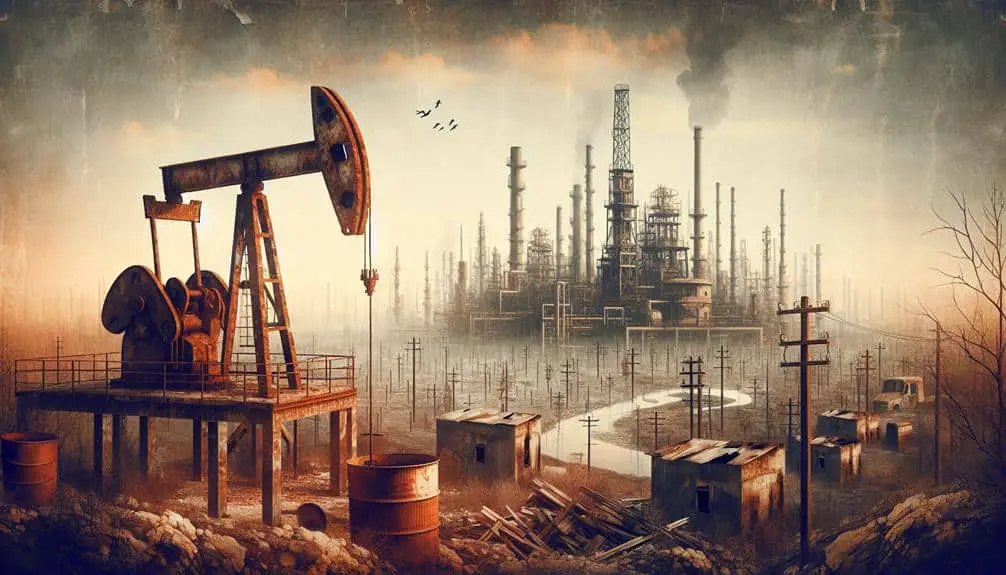Amidst rural landscapes, remnants of thriving oil towns linger, embodying the history of an industry's rise and fall. Abandoned structures reveal silent tales of prosperity and neglect. Urban exploration exposes a bygone era, where decaying sites connect you to the past. Desolate spaces resonate with past industry fervor. Witness the power of time on abandoned structures. Further understanding awaits about the preservation efforts, economic impacts, and future prospects of these historic sites.
Key Points
- Abandoned oil structures like refineries, pump jacks, and pipelines.
- Decaying industrial sites with rusted equipment and neglected buildings.
- Historical artifacts, documents, and machinery from the oil boom era.
- Ruins of worker housing, company towns, and social infrastructure.
- Environmental impacts such as polluted landscapes and water sources.
Historic Significance of Rural Oil Towns
Exploring the historic significance of rural oil towns reveals a rich tapestry of economic growth, societal change, and technological advancement intertwined with the American landscape. These towns, born from the discovery of oil, hold a unique cultural heritage shaped by the boom-and-bust cycles of the industry. The impact of oil extraction on the environment is a complex issue within these communities, where lush fields once stood now replaced by oil rigs and infrastructure.
The cultural heritage of these rural oil towns is a blend of resilience, innovation, and community spirit. Families and workers flocked to these areas, seeking opportunities and prosperity, leaving behind a mark on the landscape that still resonates today. However, this prosperity came at a cost, with the environmental impact of oil drilling evident in the scarred earth and polluted water sources.
As you explore the history of rural oil towns, you uncover a story of ambition, struggle, and progress, where the echoes of the past reverberate through the present-day landscapes. The balance between preserving cultural heritage and mitigating environmental impact remains a critical challenge for these communities moving forward.
Exploration of Abandoned Oil Structures
The remnants of rural oil towns stand as silent witnesses to the bygone era of prosperity and industrial activity, inviting exploration into the abandoned oil structures that once buzzed with life and energy. Urban exploration of these decaying industrial sites offers a glimpse into the past, providing a tangible link to the history of these once-thriving communities.
As you navigate through the rusted remnants of oil derricks and derelict refineries, you can almost sense the echoes of bustling workers and clanging machinery that once filled these now desolate spaces. The peeling paint, crumbling concrete, and overgrown vegetation serve as poignant reminders of the inevitable effects of industrial decay.
Engaging in the investigation of abandoned oil structures allows for a firsthand encounter with the raw beauty of urban decay, where nature begins to reclaim what was once man-made. It offers a unique opportunity to witness the passage of time and the transformative power of neglect.
Preservation Efforts for Oil Town Ruins
Amidst the dilapidated remnants of rural oil towns, efforts to preserve the fading echoes of a once vibrant industry are gaining momentum. Restoration projects have emerged as a beacon of hope, aiming to salvage historical structures and artifacts before they succumb to the passage of time. These projects not only seek to conserve the physical remnants but also to capture the essence of the communities that thrived in these oil-rich regions.
Community engagement plays an important role in these preservation efforts, uniting locals and enthusiasts in a common cause. By involving residents in the restoration process, a sense of ownership and pride is instilled, fostering a deeper connection to their heritage. Through collaborative initiatives, such as guided tours, workshops, and fundraising events, these communities are actively working to make sure that the stories of the past aren't lost to oblivion.
As the momentum behind preservation efforts grows, the once forgotten oil towns are slowly being revitalized, breathing new life into these historic sites and making certain that their legacy endures for future generations to appreciate.
Economic Impact of Oil Town Decline
The decline of oil towns has had a significant impact on their local economies, ushering in a period of transformation and uncertainty. As oil production wanes, job loss becomes a pressing issue, affecting not only the individuals directly employed in the industry but also those in supporting sectors. The ripple effect of job loss can lead to community displacement, as families seek opportunities elsewhere, leaving behind once-thriving towns now struggling to sustain themselves.
With the loss of jobs, businesses in oil towns also suffer, facing reduced demand and dwindling revenues. This economic downturn can lead to a domino effect, impacting the local supply chain and service industries. As businesses close or downsize, the vibrancy and dynamism that once characterized these communities start to fade, leaving behind a sense of emptiness and desolation.
The economic impact of oil town decline goes beyond just numbers; it reshapes the social fabric and dynamics of these communities, forcing them to adapt to a new reality where uncertainty looms large. The challenges posed by job loss and community displacement require innovative solutions and a collective effort to revitalize these areas and pave the way for a more sustainable future.
Future Prospects for Rural Oil Town Remnants
Discussing the potential future prospects for rural oil town remnants requires a strategic examination of adaptive measures and sustainable development initiatives. As these towns face the aftermath of the oil industry's decline, exploring redevelopment opportunities becomes pivotal. By repurposing existing infrastructure and land, these communities can potentially attract new industries or tourism, revitalizing their economies.
However, alongside these opportunities lie environmental consequences that must be carefully considered. Decades of oil extraction may have left behind polluted soil and water sources, requiring remediation efforts to guarantee the safety and health of residents. Implementing sustainable practices in any redevelopment projects can help mitigate further harm to the environment and create a more resilient community for the future.
Frequently Asked Questions
What Are Some of the Lesser-Known Stories or Folklore Surrounding Rural Oil Towns That Have Been Passed Down Through Generations?
You explore rural oil town remnants, unearthing hidden histories and folklore tales. Generational stories weave through the fabric of these places, echoing local legends. Each whispered tale adds depth to the legacy of these lands.
How Have the Demographics of Rural Oil Towns Shifted Over Time, and What Impact Has This Had on the Communities?
Embracing economic shifts, rural oil town demographics have morphed, altering community dynamics. Cultural changes bring historical significance, shaping the town's essence. As time flows, adapting to evolve remains crucial for sustainable growth.
Are There Any Unique Environmental Challenges or Concerns Associated With the Abandoned Oil Structures in Rural Oil Towns?
When looking at abandoned oil structures in rural oil towns, unique environmental challenges arise. Environmental restoration and conservation efforts are essential. Sustainable development and remediation strategies can help address these concerns, ensuring a healthier future for these areas.
How Have Advancements in Technology and Industry Affected the Landscape and Infrastructure of Rural Oil Towns?
You'll be amazed at how technological advancements and industrial progress have completely transformed the landscape of rural oil towns! The cultural heritage and folklore traditions have evolved alongside, creating a dynamic fusion of past and present.
What Role Do Local Governments and Organizations Play in the Preservation and Revitalization of Rural Oil Town Remnants?
Local governments and organizations are pivotal in preserving and revitalizing rural oil town remnants. Community engagement drives preservation efforts while economic development and tourism initiatives inject new life into these historic areas, ensuring their legacy endures.



